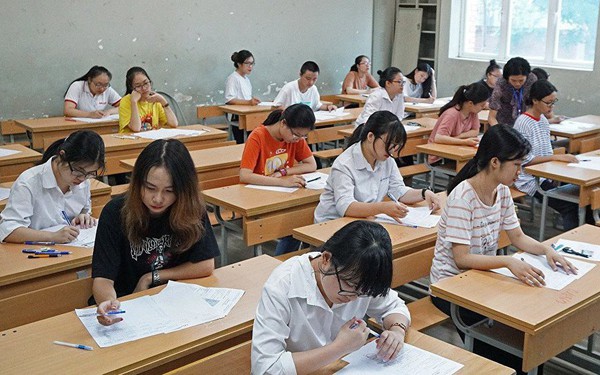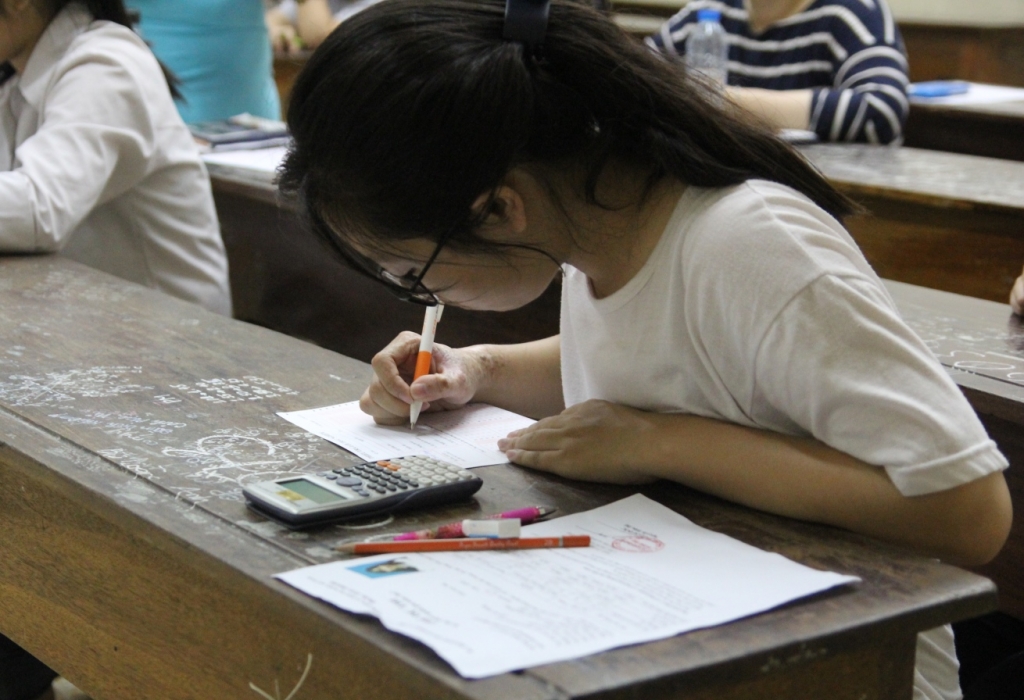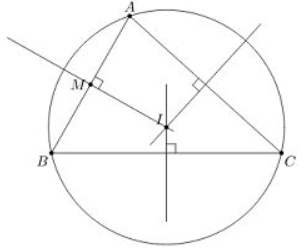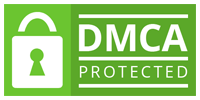Từ vựng các chủ đề chắc chắn thi & bám sát Chương trình học THPT
TOPIC: THE ENVIRONMENT
" Opportunities don't happen. You create them."
Các bài liên quan: ( sách mới)
Unit 6: Endangered species ( Tiếng Anh 12)
Unit 3: The green movement ( Tiếng Anh 12)
Unit 6: Global Warming ( Tiếng Anh 11)
Unit 9: Preserving the environment ( Tiếng Anh 10)
I. Vocab
Part I
- Environment (n): môi trường
V+ environment : preserve, protect, safeguard: bảo vệ môi trường
Damage,harm, pollution + the environment: làm hại đến, làm ô nhiễm môi trường
Pharses:
Conservation/ protection of the environment ~ environment protection: sự bảo vệ môi trường.
- Deforestation (n): nạn phá rừng
- Danger (n): sự nguy hiểm
- In danger : lâm vào hoàn cảnh nguy hiểm
- In danger of extinction: có nguy cơ tuyệt chủng
- Out of danger: thoát nạn
- Dangerous (a): nguy hiểm
- Endanger(v): gây nguy hiểm, làm nguy hiểm đến
- Endangered species: động vật bị nguy hiểm
- Biodiversity (n): đa dạng sinh học
- Contamination (n): sự ô nhiễm
Contaminate (v): làm ô nhiễm
Adj/N+ contamination: serious,massive, food, environmental..
- Waste (n): rác thải chất thải
Adj + waste : Dangerous, harmful, hazardous, toxic,poisonous, agricultural, commercial, industrial,..
V+ waste : produce, dispose of, dump, get rid of,..
Waste +N: collection, recycling, disposal...
- Emission (n): khí thải
- Erosion (n): sự xói mòn
- Pollution (n): sự ô nhiễm
N+ pollution : air, soil, water, atmosphere, environmental
V+ pollution: cause, avoid, prevent/ combat, control, fight, tackle ( kiểm soát ô nhiễm)/ cut, limit, minimize, reduce ( giảm thiểu ô nhiễm)
Pharses:
- A source of pollution : nguồn ô nhiễm
- A risk of pollution : nguy cơ ô nhiễm
- Pollutant (n): chất gây ô nhiễm
- Pollute (v): làm ô nhiễm
- Phân biệt waste, garbage, trash, rubbish, litter, leftover(s), ashes
+ Waste (n): chất thải( vật chất) bị vứt đi vì không còn giá trị sử dụng, hoặc k cần thiết sau khi hoàn thành một quá trình sử dụng
+ Garbage= rubbish: rác (nói chung), thường là rác trong nhà bếp, garbage dùng trong Anh mỹ, rubbish dùng trong anh anh
+ Trash : rác, thường là giấy vụn, bao bì, bìa , thường là “ dry materials”
+ Litter : thường là rác bị vứt bừa bãi, không đúng quy định ( nơi công cộng)
+ Leftover(s): thức ăn thừa trên đĩa, bát sau khi dọn xong
+ ashes: tro người chết, động vật chết, gỗ, than sau khi bị đốt thiếu cháy
- Recycle (v): tái chế
Một số cụm từ khác:
- Suffer/face/take the consequences of: gánh chịu hậu quả
- It stands to reason that: thật hợp lí là, điều đó là hiển nhiên...
- Have an impact on ~ have an effect on: tác động lên
- Die out: tuyệt chủng
- Get back to nature: sống gần gũi với thiên nhiên
- Cause tremedous pressure on the livelihood of sb: gây áp lực lớn về đời sống của ai đó
- Threaten the lives and health of sb: đe dọa tới tính mạng và sức khỏe của ai đó
- Conduct an environmental cleanup: tiến hành dọn dẹp môi trường
- Be under threat = be at stake/risk= in danger: có nguy cơ tuyệt chủng
- Disturb/upset the ecological balance :làm ảnh hưởng tới sự cân bằng sinh thái
Part II
1) Habitat (n): Môi trường sống
Adj+ habitat: natural/ native, endangered/ threatened, wildlife
V+ habitat: provide, conserve, protect, damage, destroy, disrupt( phá hủy)
Habitat disruption: phá hủy môi trường sống
2) Climate(n): khí hậu
Climate change: biến đổi khí hậu
3) Natural resources(n): nguồn tài nguyên thiên nhiên
4) Exhaust (n): khí thải từ động cơ
Car exhaust/ Vehicle exhaust/ Diesel, petrol exhaust
5) Vulnerable (a)= helpless= defenseless= powerless= impotent= weak: dễ bị tổn thương
6) Poach (v): săn trộm
7) Carbon footprint (n): lượng khí C02 thải ra hằng ngày của một cá nhân hoặc nhà máy.
8) Catastrophic(a)= disastrous= dire= awful= calamitous: thảm họa
9) Shortage / the lack of: Sự thiếu hụt
10) Government’s regulation: Sự điều chỉnh/luật pháp của chính phủ
11) Woodland/forest fire: Cháy rừng
12) A marine ecosystem: Hệ sinh thái dưới nước
13) Over-abuse: Lạm dụng quá mức
14) Dispose/release/get rid of: Thải ra
15) Achieve / promote sustainable development: Đạt được / thúc đẩy sự phát triển bền vững
16) Address / combat / tackle the threat / effects / impact of climate change: Giải quyết / chống lại / xử lí những đe dọa / ảnh hưởng / tác động của biến đổi khí hậu
17) Degrade ecosystems / habitats / the environment: Làm suy thoái hệ sinh thái / môi trường sống
18 ) Windmill(n): cối xoay gió
19) Use up: sử dụng cho cạn kiệt = run out of
20) Effect (n) : ảnh hưởng
Một số cụm từ khác:
1.to be absorbed in thought: miệt mài, mê mải, chăm chú; lôi cuốn, thu hút sự chú ý
2. be in a floods of tears: khóc như mưa
3. be at an alarming rate : ở mức báo động
4. the most pressing problem: vấn đề cấp bách nhất
5. (to) face acute fresh water shortage : đối mặt với tình trạng thiếu nước nghiêm trọng
6. (to) put emphasis on individuals’ attempt: chú trọng vào nỗ lực của cá nhân
7. Raise one’s awareness : nâng cao nhận thức
8. ( to) yield a healthier atmosphere: mang lại bầu không khí trong sạch hơn
II. Exercise
Exercise 1: Complete the sentences with words from the box
|
Pollution |
Deforestation |
Protection |
Warming |
Effect |
|
Biodiversity |
Recycle |
Windmill |
Gases |
Used up |
1. There is a growing concern over the _________ of species habitat and_________
2. The earth’s resources are being ________ at an alarming rate.
3. The greenhouse __________ is an increase in the amount of carbon dioxide and other __________ in the atmosphere which is believed to be the cause of a gradual __________ of the surface of the Earth.
4. The energy generated by the _________ is both very effecient and clean.
5. There have been many reports about ___________ which is destroyinng large areas of tropical rain forest.
6. The Japanese __________ more than half their waste paper.
7. We’re not doing enough to protect the environment from____________.
key :
1. protection- biodiversity ( Có một mối quan tâm đang tăng lên về sự bảo vệ môi trường sống của loài và sự đa dạng sinh học)
2. used up ( Nguồn tài nguyên của trái đất đang bị dùng cho cạn kiệt ở mức đáng báo động)
3. effect- gases-warming ( Hiệu ứng nhà kính là sự tăng lượng khí CO2 và các khí khác trong bầu khí quyển mà người ta tin rằng đó là nguyên nhân của sự ấm lên từ từ của bề mặt trái đất)
4. windmill ( Năng lượng được tạo ra từ cối xay gió thì vừa hiệu quả vừa sạch)
5. deforestation ( Có nhiều báo cáo về nạn phá rừng , đang phá hủy nhiều diện tích rừng mưa nhiệt đới)
6. recycle ( Người Nhật tái chế hơn nửa số giấy vụn của mình)
7. pollution ( Chúng ta vẫn chưa làm đủ để bảo vệ môi trường khỏi sự ô nhiễm )
Exercise 2: Complete the text using an appropriate form of the words.
(1. pollution)________ is one of the biggest problems facing our society. In the last decades, politicians (2. science)________ and environmentalists have been very (3. worry)_________ about the world’s health. (4. harm)________ substances produced by vehicles, companies, rubbish and the (5. exploit)________ of minerals, forests and oil by businesses and industry are (6. damage)________ our future as well as the future of our children. This problem will be very difficult to (7. solution)_______ because there are (8. difference)________ kinds of pollution involving air, water, noise and light, and there are different factors which (9.threat)________ the environment. Information and the creation of (10. aware)__________ of (11. environment)__________ issues seems to be an important weapon for (12.redution) ________ pollution. For instance, (13. recycle)________ waste and rubbish as well as biodegradable materials is the first step that everyone should take in order to combat this problem.
key:
|
1. Pollution |
5. exploitation |
9. threaten |
13. recycling |
|
2. scientists |
6. damaging |
10. awareness |
|
|
3. worried |
7. solve |
11. environmental |
|
|
4. harmful |
8. different |
12.reducing |
|
Exercise 3: Read the passage and choose the best answer (A, B, C or D) to each of the questions given:
There are many ways that recycling helps the environment, and even the smallest step can have significant results.
The environmental problem of landfills is a difficult issue to fix. As more waste is put into landfills, the bigger the problem gets. Wastes that are not biodegradable or are slow to decompose can remain in landfill sites for centuries, often emitting gases that could be harmful to the environment. Keeping paper out of landfills is just one way that recycling helps the environment.
Recycling items often uses less energy than manufacturing products from natural sources. Making paper that is using recycled pulp, for instance, is much less energy intensive than using new wood. While there are benefits to growing trees because of the carbon dioxide that they consume, it will be the damage that is done to the environment by putting paper in landfills and using energy to produce new items.
Waste in landfills emit gases as it rots. This can pollute the environment. Anyone who has passed a landfill site during hot weather will be familiar with the unpleasant smell and flies that can be found near a landfill site. Reducing the items in landfills will help to reduce the pollution that it causes. Recycling wastes also typically emits less carbon dioxide and carbon monoxide, thus reducing the carbon footprint of a product.
Another benefit of recycling is that there is often a significant cost saving to be made when using recycle goods. Recycling leaves and grass, for instance, is a great way to make compost. Using homemade compost is obviously a lot cheaper than buying compost and this is a useful way to save money. Saving money through recycling ultimately helps the environment.
Recycling is just one of many ways that we can help the environment. Every step that we take, however small, is one more towards helping and supporting the environment in which we live. Getting everyone involved, from children to adults, can help produce a better environment for many generations to come.
Vocab:
- biodegradable (adj) /ˌbaɪəʊdɪˈɡreɪdəbl/: phân hủy sinh học
- carbon dioxide (n) /ˌkɑːbən daɪˈɒksaɪd/: khí CO2
- carbon monoxide (n) /ˌkɑːbən mənˈɒksaɪd/: khí CO
- carbon footprint (n) /ˌkɑːbən ˈfʊtprɪnt/: dấu chân carbon (thước đo lượng khí CO2 được tạo ra bởi các hoạt động hàng ngày của một người hoặc công ty)
- cost-effective (adj) /ˌkɒst ɪˈfektɪv/: có hiệu quả chi phí
- decompose (v) /ˌdiːkəmˈpəʊz/: phân hủy, làm mục rữa
- emit (v) /iˈmɪt/ : phát ra, bốc ra, sự toả ra (mùi vị, hơi...)
- fly (n) /flaɪ/: con ruồi ---> files
- issue (n) /ˈɪʃuː/: vấn đề
- landfill (n) /ˈlændfɪl/ : bãi rác
- make compost /ˈkɒmpɒst/: làm phân hữu cơ ---> homemade compost (n): phân hữu cơ tự chế
- manufacture (v) /ˌmænjuˈfæktʃə(r)/: sản xuất; chế tạo
- product (n) /ˈprɒdʌkt/ : sản phẩm
- recycled pulp (n) /pʌlp/: bột giấy tái chế
- rot (v) /rɒt/: mục nát, thối rữa
- significant (adj) /sɪɡˈnɪfɪkənt/ : có ý nghĩa, quan trọng, đáng kể
- unpleasant (adj) /ʌnˈpleznt/: khó chịu
Question 1: The environmental problem of landfills is a difficult issue to fix because _________
- wastes can make the soil biodegradable or slow to decompose
- we have difficulty keeping paper out of landfills for recycling
- the problem gets bigger and more waste is put into landfills
- wastes can remain in landfill sites for centuries, often emitting harmful gases
Question 2: The following statements are the benefits of recycling paper EXCEPT that__________.
- recycling uses less energy than manufacturing new products
- recycling helps use more energy to produce new items
- recycling helps protect trees that can consume carbon dioxide
- recycling helps reduce wastes at landfill sites
Question 3: Recycling can help to solve the problem of pollution because _________.
- it reduces the carbon footprint of products
- it helps people stay far away from landfill sites
- it helps people forget the unpleasant smell and flies
- it reduces biodegradable wastes at households
Question 4: Using homemade compost is cost-effective as _______. .
- it is a good way to make compost at home
- we can recycle leaves and grass
- it is both economical and good for environment
- it can prevent unpleasant smell or flies
Question 5: All of the following statements are true EXCEPT that __________.
- recycling wastes also helps us to limit harmful gases
- there are many ways that we can do to help the environment
- even the smallest thing we do might have significant results in protecting the environment
- getting adults involved in recycling can help to have a better environment.
key
Question 1: D
D. wastes can remain in landfill sites for centuries, often emitting harmful gases
---> thông tin nằm trong câu "Wastes that are not biodegradable or are slow to decompose can remain in landfill sites for centuries, often emitting gases"
Question 2: B
A. recycling uses less energy than manufacturing new products ---> thông tin nằm trong câu "Recycling items often uses less energy than manufacturing products from natural sources" ---> đúng
B. recycling helps use more energy to produce new items ---> sai. CHỌN ĐÁP ÁN B
C. recycling helps protect trees that can consume carbon dioxide ---> thông tin nằm trong câu "there are benefits to growing trees because of the carbon dioxide that they consume"
D. recycling helps reduce wastes at landfill sites ---> thông tin nằm trong câu "Reducing the items in landfills will help to reduce the pollution that it causes"
Question 3: A
A. it reduces the carbon footprint of products
---> thông tin nằm trong câu "Recycling wastes also typically emits less carbon dioxide and carbon monoxide, thus reducing the carbon footprint of a product".
Question 4:C
C. it is both economical and good for environment
---> thông tin nằm trong câu "Another benefit of recycling is that there is often a significant cost saving to be made when using recycle goods. Recycling leaves and grass, for instance, is a great way to make compost."
Question 5: D
A. recycling wastes also helps us to limit harmful gases ---> thông tin nằm trong câu "Recycling wastes also typically emits less carbon dioxide and carbon monoxide, thus reducing the carbon footprint of a product."
B. there are many ways that we can do to help the environment ---> thông tin nằm trong câu "There are many ways that recycling helps the environment."
C. even the smallest thing we do might have significant results in protecting the environment ---> thông tin nằm trong câu "even the smallest step can have significant results."
D. getting adults involved in recycling can help to have a better environment ---> sai so với thông tin trong bài "Getting everyone involved, from children to adults, can help produce a better environment for many generations to come."
---> CHỌN ĐÁP ÁN D







